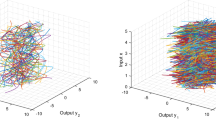Abstract
We prove a measurability result which implies that the measurable events concerning the values of a fuzzy random variable, in two related mathematical approaches wherein the codomains of the variables are different spaces, are the same (provided both approaches apply). Further results on the perfectness of probability distributions of fuzzy random variables are presented.
Similar content being viewed by others
References
Blackwell, D. (1956). On a class of probability spaces. In J. Neyman (Ed.), Third Berkeley symposium on mathematical statistics and probability (Vol. 2, pp. 1–6). Berkeley: University California Press.
Couso, I., Dubois, D., & Sánchez, L. (2014). Random sets and random fuzzy sets as ill-perceived random variables. Cham: Springer.
Diamond, P., & Kloeden, P. (1994). Metric spaces of fuzzy sets. Singapore: World Scientific.
Doob, J. L. (1948). On a problem of Marczewski. Colloquium Mathematicum, 1, 216–217.
Fremlin, D. H. (2002). Measure theory (Vol. 3). Colchester: Torres Fremlin.
Gil, M. A., Colubi, A., & Terán, P. (2014). Random fuzzy sets: Why, when, how. Boletín de Estadística e Investigación Operativa, 30, 5–29.
Gil, M. A., & López-Díaz, M. (1996). Fundamentals and Bayesian analyses of decision problems with fuzzy-valued utilities. International Journal of Approximate Reasoning, 15, 203–224.
Gnedenko, B. V., & Kolmogorov, A. N. (1954). Limit distributions for sums of independent random variables. Reading: Addison-Wesley.
González-Rodríguez, G., Colubi, A., & Gil, M. A. (2012). Fuzzy data treated as functional data: A one-way ANOVA test approach. Computational Statistics & Data Analysis, 56, 943–955.
Inuiguchi, M., Kato, K., & Katagiri, H. (2016). Fuzzy multi-criteria optimization: Possibilistic and fuzzy/stochastic approaches. In S. Greco, M. Ehrgott, & J. R. Figueira (Eds.), Multiple criteria decision analysis (2nd ed., pp. 851–902). New York: Springer.
Jaynes, E. T. (2003). Probability theory: The logic of science. Cambridge: Cambridge University Press.
Jessen, B. (1948). On two notions of independent functions. Colloquium Mathematicum, 1, 214–215.
Krätschmer, V. (2001). A unified approach to fuzzy random variables. Fuzzy Sets and Systems, 123, 1–9.
Krätschmer, V. (2002). Some complete metrics on spaces of fuzzy subsets. Fuzzy Sets and Systems, 130, 357–365.
Krätschmer, V. (2004). Probability theory in fuzzy sample spaces. Metrika, 60, 167–189.
Krätschmer, V. (2006). Integrals of random fuzzy sets. Test, 15, 433–469.
Kruse, R., & Meyer, K. D. (1987). Statistics with vague data. Dordrecht: Reidel.
Li, S., Ogura, Y., & Kreinovich, V. (2002). Limit theorems and applications of set-valued and fuzzy set-valued random variables. Dordrecht: Kluwer.
Parthasarathy, K. R. (1967). Probability measures on metric spaces. New York: Academic Press.
Puri, M. L., & Ralescu, D. A. (1986). Fuzzy random variables. Journal of Mathematical Analysis and Applications, 114, 409–422.
Ramachandran, D. (2002). Perfect measures and related topics. In E. Pap (Ed.), Handbook of measure theory, Chapter 18 (pp. 765–786). Amsterdam: Elsevier.
Rodríguez-Muñiz, L. J., & López-Díaz, M. (2008). A new framework for the Bayesian analysis of single-stage decision problems with imprecise utilities. Fuzzy Sets and Systems, 159, 3271–3280.
Srivastava, S. M. (1998). A course on Borel sets. New York: Springer.
Terán, P. (2006). A note on Yoshida’s optimal stopping model for option pricing. European Journal of Operational Research, 170, 672–676.
Terán, P., & Moreno-Jiménez, J. M. (2008). Group decision making with soft AHP based on the random set view of fuzzy sets. In D. Dubois, M. A. Lubiano, H. Prade, M. Á. Gil, P. Grzegorzewski, & O. Hryniewicz (Eds.), Soft methods for handling variability and imprecision (pp. 427–434). Berlin: Springer.
Trutschnig, W., González-Rodríguez, G., Colubi, A., & Gil, M. A. (2009). A new family of metrics for compact, convex (fuzzy) sets based on a generalized concept of mid and spread. Information Sciences, 179, 3964–3972.
Xu, J., & Zeng, Z. (2014). Fuzzy-like multiple objective multistage decision making. Cham: Springer.
Yano, H. (2017). Interactive multiobjective decision making under uncertainty. Boca Raton: CRC.
Yoshida, Y. (2003). The valuation of European options in uncertain environment. European Journal of Operational Research, 145, 221–229.
Yoshida, Y., Yasuda, M., Nakagami, J., & Kurano, M. (2006). A new evaluation of mean value for fuzzy numbers and its application to American put option under uncertainty. Fuzzy Sets and Systems, 157, 2614–2626.
Acknowledgements
Research in this paper was partially funded by Spain’s Ministerio de Economía y Competitividad (MTM2015–63971–P) and Asturias’ Consejería de Empleo, Industria y Turismo (GRUPIN-IDI2018-000132). Moreover, it was partially carried out while the first author enjoyed a Beca de colaboración from Spain’s Secretaría de Estado de Educación, Formación Profesional y Universidades.
Author information
Authors and Affiliations
Corresponding author
Additional information
Publisher's Note
Springer Nature remains neutral with regard to jurisdictional claims in published maps and institutional affiliations.
Rights and permissions
About this article
Cite this article
Alonso de la Fuente, M., Terán, P. Harmonizing two approaches to fuzzy random variables. Fuzzy Optim Decis Making 19, 177–189 (2020). https://doi.org/10.1007/s10700-020-09317-w
Published:
Issue Date:
DOI: https://doi.org/10.1007/s10700-020-09317-w




